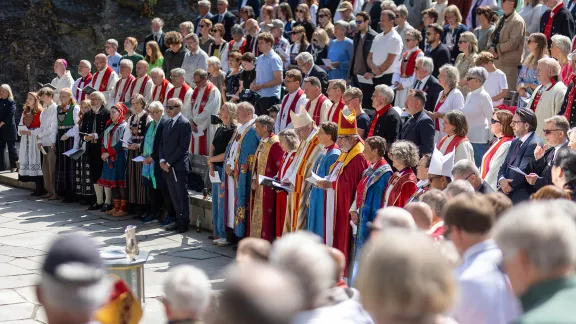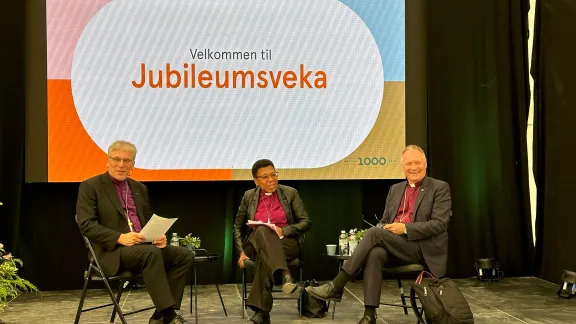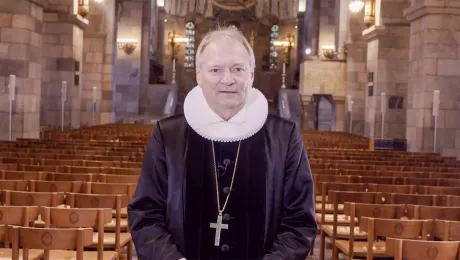
A festive church service with ecumenical guests was held on the anniversary of the adoption of Christian law in Norway 1000 years ago. LWF President Henrik Stubkjær, and the Regional Secretary for Europe, Ireneusz Lukas, were among the guests. Photo: Gjermund Øystese, Norges Kristne Råd
Remembering the past to shape the future
(LWI) - A thousand years ago, in 1024, a Christian law code was adopted in Norway. Later known as Kristenretten, this Christian law was introduced by King Olav II, later known as Saint Olav. Introducing the law code marked a vital step in the Christianization and nation-building in Norway.
Under the theme “Celebrate the past, shape the future,” the Church of Norway marked this anniversary from 24 May to 2 June in Moster on the southwestern coast of Norway. The Lutheran World Federation (LWF) was represented by its president, Bishop Henrik Stubkjær, and the Regional Secretary for Europe, Rev. Dr Ireneusz Lukas.
The introduction of Christian law installed values of the Christian faith in society, such as that every human being is created in the image of God and meant that conflicts should be resolved through law and justice, not by revenge, explained Olav Fykse Tveit, Presiding Bishop of the Church of Norway. The new law also strengthened the rights of women, children and the poor.
“It is important to celebrate that we have thousand years of Christianity in Norway, and a thousand years of Christianity has shown us how to live together as a society,” Fykse Tveit said. “Our values are constantly challenged, both in Norway and internationally. It challenges us to consider what we should stand for as a church and a country built on Christian and humanistic values.”
Traditionally, the relationship between church and state has been very close in Norway. Christian III introduced the Reformation in 1537. The Lutheran doctrine became a state religion, which only ended in 2017.

Panel discussion on “The values of the church” with (from left) the Presiding Bishop of the Church of Norway, Olav Fykse Tveit, Anglican Bishop Rosemarie Mallett from the Diocese of Southwark, United Kingdom, and LWF President Henrik Stubkjær. Photo: LWF/I. Lucas
A vision for justice, peace and reconciliation
LWF President Stubkjær joined an ecumenical panel on the values of the church with Presiding Bishop Fykse Tveit and Anglican Bishop Rosemarie Mallett from the Diocese of Southwark, United Kingdom. President Stubkjær said, “Human rights are the foundation for human dignity, and therefore, they are foundational to our faith, values and identity as Christians and as Lutherans.” He added that we are called “to promote the God-given dignity of every person – particularly those who are oppressed and vulnerable.” He said training LWF member churches on human rights is “a key aspect of our theology and faith,” and human rights advocacy must “remain a core part of the churches’ ministries.”
Advocacy for human rights is a central part of churches’ prophetic voice and holistic mission, added President Stubkjær. “LWF’s vision is for a just, peaceful, and reconciled world. That will only be achieved if the values of human rights, dignity, justice and peace are promoted while renouncing and fighting structures that perpetuate injustices, violence, hatred, and intolerance.”
Learn more on the website of the Church of Norway, (in Norwegian)


